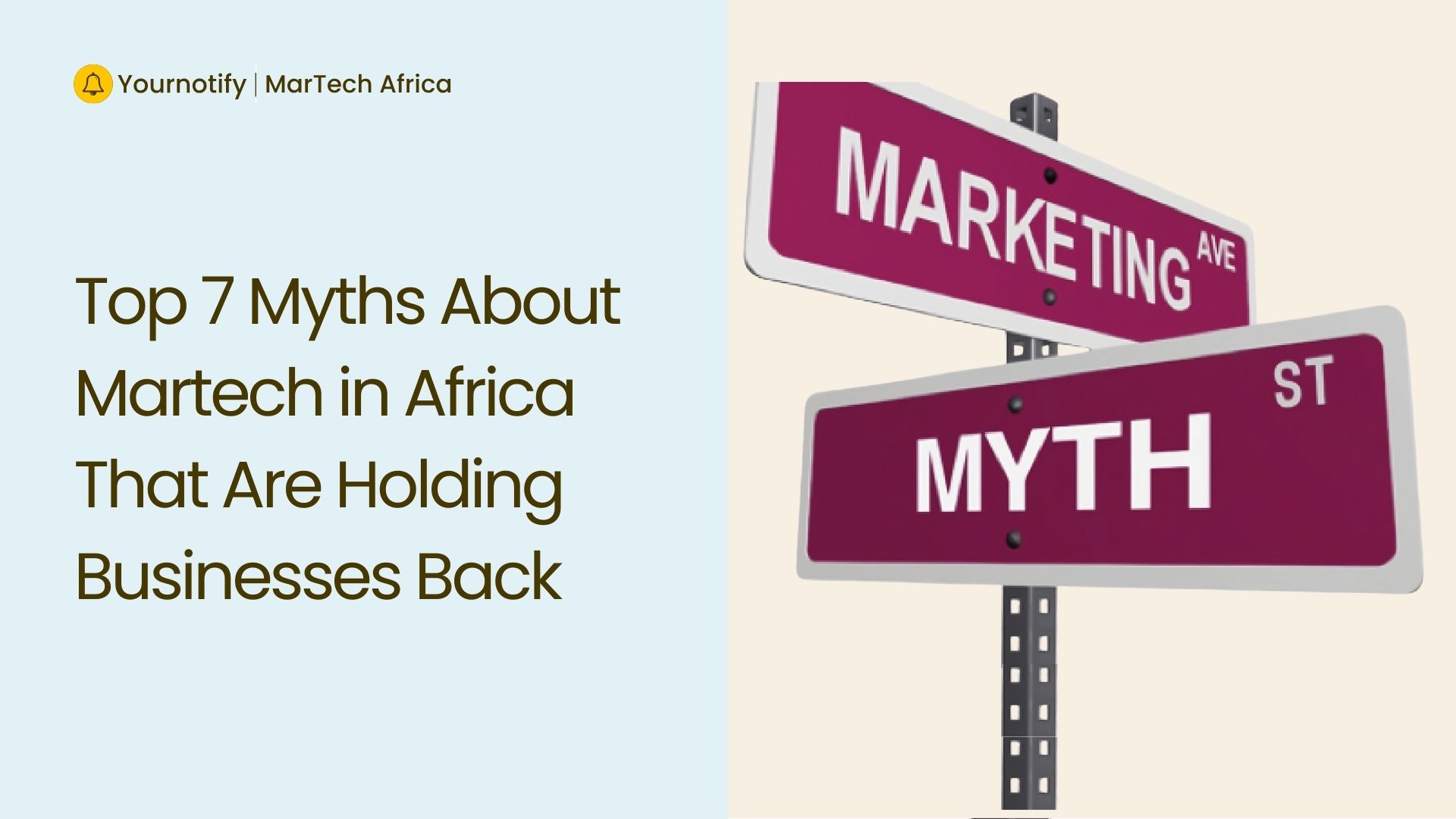When we think of marketing, images of flashy campaigns, billboards, or Facebook ads usually come…

How to Build a How to Build a Data-Driven Marketing Strategy: Key Lessons for African Brands
Mobile connectivity has become the primary gateway to the internet, with smartphones driving activities like shopping, banking, entertainment and social interaction. This mobile-first reality, combined with a deep demand for cultural authenticity, means African consumers expect brands to speak their language, reflect their values, and engage them in ways that feel both relevant and personal.
At the same time, the shift away from third-party cookies and the growing emphasis on data privacy have placed first-party data at the center of competitive advantage. For African brands navigating this landscape, relying on guesswork or traditional marketing playbooks will not give you the desired insights and result for your campaigns.
What’s needed is a robust, data-driven strategy that blends global best practices with an understanding of Africa’s unique markets where youthful demographics, rapid urbanization, and digital entrepreneurship create fertile ground for innovation.
The following lessons highlight how to harness Africa’s distinctive opportunities to drive growth, build loyalty, and future-proof brand relevance.
-
Prioritize First-Party Data
As global regulations tighten and third-party cookies fade into obsolescence, first-party data has emerged as the most reliable, ethical, and future-proof asset for African marketers. Unlike third-party information, which is often fragmented and opaque, first-party data is gathered directly from customer touchpoints. It could be through website interactions, mobile app usage, loyalty programs, or purchase history.
A Forrester study revealed that while 85% of marketers agree behavioral first-party data (like clicks, page views, and searches) is critical, only 37% are effectively collecting it. This gap shows the competitive advantage for African brands that invest early in data infrastructure and strategy.
In South Africa, a retailer achieved a 5.4% lift in conversions within two months by leveraging first-party data, while a supplement brand saw a 3.6× boost in conversions in just one month. Similarly, a local alcohol brand increased its click-through rates nearly 3× in two months using personalized campaigns powered by customer data.
-
Craft Highly Segmented, Personalized Campaigns
Generic marketing messages no longer suffice in Africa’s diverse and rapidly digitizing markets. To remain relevant, brands must segment audiences based on purchase patterns, location, and behavioral signals—then craft messaging that resonates with each group.
-
Frequent buyers: Reward loyalty with early access, exclusive perks, or VIP programs.
-
Occasional buyers: Re-engage with seasonal promotions, personalized reminders, or bundles that spark repeat purchases.
This level of personalization has measurable impact. According to a Kibo survey referenced by Iterable, real-time personalization efforts yielded at least 200% ROI for 70% of marketers a compelling benchmark that, while not Africa-specific, offers a powerful comparison.
-
Leverage Channel Analytics to Optimize Spend
Data is critical for making smarter budgeting decisions. By taking advantage of channel analytics, brands can identify where their marketing spend delivers the highest return, and adjust campaigns accordingly.
-
Cross-channel attribution allows marketers to see how different digital touchpoints. It helps identify if it’s social media, paid search, or email that’s contributing to conversions. This helps prevent overspending on low-performing channels and ensures resources are directed to the platforms that actually influence customer journeys
-
Continuous testing and optimization are equally vital. Running A/B tests on channels, creative assets, and messaging provides actionable insights into what resonates with different segments.
-
Embrace Mobile-First Strategy & In-App Analytics
Mobile has become the primary gateway to the internet across Africa—making a mobile-first approach not just optimal, but essential for brand relevance and growth.
-
In Africa, 76.1% of internet traffic comes from mobile devices, compared to just 22.8% from desktop. Notably, Nigeria sees 83.5% mobile traffic share, one of the highest globally.
-
While mobile internet usage sees regional disparities, access continues to grow. As of 2023, mobile penetration across Sub-Saharan Africa was 44%, and 27% of the population used mobile internet, highlighting both widespread reliance on mobile and an opportunity for greater inclusion.
For app-based brands, tracking metrics like Customer Lifetime Value (CLV) and optimizing ad bids through real-time analytics have proven vital.
-
Activate Geomarketing & Localization
African markets are highly fragmented culturally, linguistically, and economically. This makes geomarketing, or location-based targeting, a powerful tool for brands aiming to deliver the right message to the right audience. By using data from GPS, mobile networks, or IP addresses, businesses can tailor campaigns by geography, maximizing impact while reducing wasted spend.
Localization extends beyond geography. It’s about speaking directly to people’s lived experiences. Campaigns rooted in culturally relevant storytelling, for example using vernacular languages, local idioms, and visual motifs resonate more deeply with African audiences than generic global templates.
-
Harness Influencer Partnerships & Storytelling
Traditional advertising, built on broad claims and generic promises, is losing its impact. People want to hear voices they can trust, stories that feel true, and messages that reflect their realities.
Authentic storytelling has become the bridge between brands and communities. When campaigns are rooted in cultural relevance they resonate far more deeply than imported narratives. Consumers are quick to spot inauthenticity, but when a brand’s message feels honest and familiar, it sparks not only attention but also loyalty.
-
Adopt Predictive Analytics & Behavioral Retargeting
Forecasting demand trends, identifying customers most at risk of churn, and proactively tailoring retention strategies help businesses stay ahead of consumer needs rather than reacting after the fact.
Hand in hand with this is the power of behavioral retargeting. Instead of serving generic ads, brands can re-engage audiences based on real-time signals. These micro-moments of intent, when acted upon with precision, dramatically increase the odds of conversion. Global benchmarks suggest that retargeted ads are up to 10 times more effective at generating clicks and purchases than standard display campaigns, and early adopters in African markets are beginning to see similar lifts in performance.
-
Build a Culture of Data Literacy & Ethical Use
Sophisticated tools and analytics platforms may give brands access to data, but without the right culture and understanding, these assets remain underutilized. The teams across marketing, product, and sales will need to develop data literacy.
Encouraging cross-departmental collaboration, regular training, and open access to clear, visualized reports ensures that data moves from being a siloed function to a shared strategic resource.
Equally important is how that data is used. In an environment where consumers are becoming more conscious of their digital footprints, ethical data practices are central to building lasting trust. This means prioritizing transparency in how information is collected, giving customers control over their data, and respecting privacy regulations.
To excel in today’s market, African brands must ground their marketing in data, informed by local realities and delivered through mobile-first, personalized, and culturally resonant experiences. By blending global best practices with insights rooted in African markets and leveraging home-grown tech.
Related Content
Customer Data Platform (CDP) Explained: What It Is, How It Works, and Why It Matters


